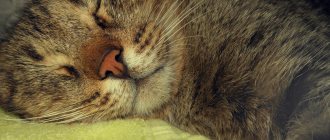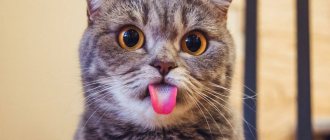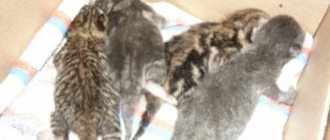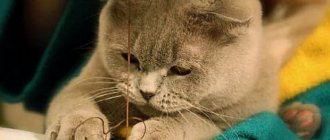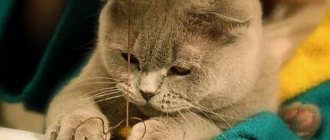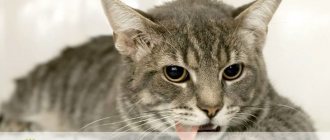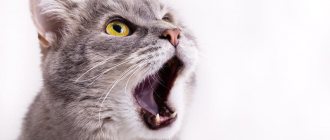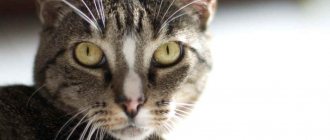Almost every person has a pet. The choice of many falls on cats. These are very cute, gentle creatures, fluffy bundles of happiness. They can be very funny and can even show their tongue. But have you ever wondered what this gesture could actually mean? In the article we will tell you what it means if a cat sticks out its tongue, what are the physiological causes and possible diseases. You will also learn how to determine when a protruding tongue is normal and when it is pathological.
You can often notice a protruding tongue on cats
Normal conditions
In what cases is a protruding tongue considered normal? Cats usually do not show this part of their body. It is considered normal if the tip of the kittens’ tongue remains protruding when they, having played enough, fall asleep from fatigue.
Adult animals may simply forget to retract the “natural sponge” back after washing. It happens that a cat sticks out the tip of its tongue and freezes for a while in this position. Then he definitely puts it in his mouth.
The protruding tongue of an animal that is in a relaxed state or in sleep is also normal. At this moment, the organ lengthens somewhat and does not fit completely in the mouth. After active play, the cat may pant frequently for some time. In this case, the tip of the tongue sticks out. This helps saturate the tissues with oxygen.
The cause of the protruding tip of the tongue is heat. Animals do not have sebaceous glands, which is how they protect themselves from overheating. Some pets can tease their owners. If this short-term phenomenon (especially during the game) is not accompanied by other alarming symptoms, then it is normal.
Cat shows tongue: normal or pathological
Cats are cocky creatures and can tease their relatives, but they do it differently than small children sticking out their tongues at each other. If the owner identifies rational reasons, you can calm down. You just need to find out from an experienced felinologist whether the protruding tongue is a defect that is inherited by the offspring and whether the animal can be used for breeding.
When the cause of the protruding tongue cannot be determined or pathological symptoms are detected, it is necessary to seek veterinary help.
Be sure to read:
Why cats rub their faces against their legs: reasons, wean or encourage, what the consequences may be
Physiological reasons
English scientists believe that sticking out the tip of the tongue does not at all indicate relaxation. On the contrary, it is a sign of aggression. Especially if the animal twitches its tail at the same time. Other explanations for why a cat sticks out the tip of its tongue :
- In hot weather, this indicates impaired heat exchange.
- If at the same time the cat becomes aggressive and starts salivating heavily, this may be a sign of rabies or other dangerous infections.
- Researchers in California have discovered why some mature animals have protruding tongues. It simply does not fit completely into the mouth due to certain oral diseases.
- Crossing different breeds sometimes results in the birth of mentally retarded kittens. In such animals, the tip of the tongue sticks out constantly and hangs limply.
- Persians have an overbite due to their flat muzzle.
- The cat sticks out its tongue reflexively at the sound of the tape being torn off.
- In British Folds, diseases associated with the structure of the skeleton are detected.
- Thai cats, if distracted, are more likely than other cats to forget to put their tongue back. However, this is also a sign of complete trust.
The tip of a cat's tongue contains taste buds. A protruding tongue may indicate an impaired sense of smell. Before giving birth, the animal begins to become very nervous, constantly licks itself, and can sit for a long time with its tongue hanging out. The cause may also be a bone stuck in the mouth. It has been observed that many cats react this way to dogs.
If there are problems
Run to the vet - when sticking out tongue is a serious symptom
If your cat constantly walks with its tongue hanging out and additional symptoms appear, then you should not hesitate to contact a veterinarian.
The most common signs of disease in cats with protruding tongues include:
- A runny nose and cough are often accompanied by a cat sticking out its tongue. Congestion in the respiratory tract forces the animal to breathe more through the mouth, and the tongue falls out due to general weakness during a cold.
- Wheezing, lack of coordination, decreased appetite, coupled with a constantly sticking out tongue indicate heart problems in a cat. The mucous membranes may also turn blue, since the blood is poorly saturated with oxygen and its venous component becomes predominant.
- Vomiting and diarrhea indicate poisoning in a cat with its tongue hanging out.
- Coughing, ulcers on the mucous membranes, changes in the color of saliva, a crust on the nose and a protruding tongue are clear evidence of an infectious disease.
- If there is bad breath, refusal of solid food and ulcers in the oral cavity - a protruding tongue is a signal of stomatitis in a cat.
- Complete refusal to eat, strong bad breath and difficulty swallowing water are a sign of a growing tumor. Moreover, it is sometimes impossible to see it on your own for a long time.
- Loss of coordination and eye rolling for no reason indicate brain injury. It doesn’t matter whether it is physical or infectious - the general symptom in cats is similar.
- Tremors and a protruding tongue are evidence of a fever in the cat.
First aid for a cat with a long-term protruding tongue
If you are not sure that your cat's tongue sticking out is normal, then first check the oral cavity for a foreign body stuck. Sometimes a punctured bone can cause drooling and a slightly protruding tongue.
If the room is hot, then give the cat a drink of cool water, moderately wet the fur, or simply move the animal to a cool place. Having cooled down, the cat will hide its tongue back.
But in cases where you were unable to help your pet on your own, and additional symptoms began to appear, do not delay your visit to a specialist. It is not normal for cats to always walk with their tongue hanging out; only animals with disabilities do this, and if they are congenital, you need to know about them and have instructions from a specialist on how to help the cat in daily conditions.
Diseases that cause cats to stick out their tongues
A protruding tip of the tongue appears due to various diseases. These include swelling of the larynx, allergies, and inflammation of the mouth. A protruding tongue appears due to :
- jaw injuries;
- cardiovascular failure;
- disorders in the functioning of the brain;
- nervous diseases, stress;
- traumatic brain injuries;
- high temperature;
- muscle atrophy;
- dental diseases;
- disturbances in breathing or functioning of the salivary glands.
The cat cannot move its tongue after anesthesia. The mouth closes completely only after a day. Wounds in the mouth area prevent you from removing your tongue. If this phenomenon is accompanied by cough, vomiting, diarrhea or intestinal disturbances, then the cause is most likely poisoning.
If the tip of a cat's tongue sticks out, there can be many reasons for this, and most of them do not indicate disease. Some pets, realizing that the owners are touched and give something tasty, repeat the trick several times on purpose.
Source
Diseases that may cause a cat to stick out its tongue
- Serious damage to the jaw
- Insufficiency of the cardiovascular system
- Disruption of natural processes occurring in the brain
- Mental disorder, nervous overstrain, severe fear
- Brain injury
- Increased body temperature
- Muscle atrophy
- Dental problems
- Breathing problems
- Disorders of the salivary glands
- Recovery from anesthesia. The cat will be able to completely close its mouth only a day after it.
- Sores or ulcers in the mouth.
- Stomach-related diseases: vomiting, diarrhea. The cause may be poisoning.
Why does the cat show his tongue?
Probably everyone has at least once seen a cat stick out its tongue and been touched by this sight. The animal’s face looks very funny at this moment, causing smiles on the part of those around you.
On the Internet you can find a lot of funny photos and videos of a cat sticking out its tongue. There are even animations and emoticons depicting such animals. You can download wallpapers for your computer desktop with similar pictures for free.
However, is all this as cute and funny as it seems at first glance? Should you laugh or should you cry when you see a cat with its tongue hanging out? The animal may need urgent medical attention.
Why does a cat stick out the tip of its tongue: the opinion of veterinarians
A cat's tongue sticking out is a normal phenomenon or a habit when the cat has no pathological signs. There is a breed predisposition: cats of such short-faced breeds as Persians, Himalayans, exotics, as well as British and Scottish cats love to sit with their tongues hanging out.
It’s one thing when the tongue appears and disappears, and another when this position becomes permanent. Therefore, when a veterinarian is contacted with complaints about a pet’s constantly open mouth, he examines the cat in order to detect or exclude pathological symptoms.
When a cat's tongue sticks out is normal
Veterinarians will name many pathologies in which a cat sticks out its tongue. However, we are not necessarily talking about illness. Do not panic ahead of time if you notice strange behavior in your pet. There are many situations in which a cat’s tongue sticking out is normal. Among the most common are the following :
- The animal is as relaxed as possible . As a rule, this happens during sleep. The tongue, like any muscular organ, should also rest. After all, it already has a lot of functions that tire it. During relaxation, the cat's tongue becomes slightly longer than when it is tense. So it sticks out of the mouth. This feature is unique to pets. Cats living in the wild cannot afford to relax for a second. They are tense even in their sleep, and they always keep their tongues shut.
- Cats stick out their tongues due to the heat . The pet's heat exchange has been disrupted. It is urgent to give him something to drink and move him to a cool place if the cat is in the sun. Without doing this, you can bring the animal to heatstroke.
- Malocclusion is another common reason for a cat sticking out its tongue . The abnormal structure of the jaw is to blame, in which it is shorter than necessary; the organ simply does not fit in the mouth. Malocclusion is common in artificially bred elite breeds. Sometimes this becomes a real shock for cat owners who dream of world fame for their pet. After all, with such a defect, an animal, even if it is of royal blood, will not be able to participate in exhibitions and other prestigious events.
- Another reason is simple forgetfulness. The cat sometimes just gets distracted. Periodically forgets to hide his tongue even after hygiene procedures. This happens, for example, when she was washing her face and the owner called out to her. The cat turned around, but didn’t have time to hide his tongue. As a result, the cute photo is ready.
When a cat's tongue sticking out is normal
First, let's agree that if a cat shows its tongue, it is not always a sign of ill health. Thus, a cat sticks out its tongue and breathes frequently during labor. Loving male cats can sit with their mouths slightly open, from which their tongue protrudes, during sexual heat. It happens that an adult or kitten sticks out its tongue after running or in the heat. In addition, the tongue peeks out of the mouth of cats or kittens caught by surprise (for example, when the owner discovered them eating food from the table or while “tearing” a flower in a pot). And sometimes adult cats and even kittens sit with their tongues hanging out when they are hunting for a mouse or, for example, a dragonfly outside the window.
Photo: cat shows tongue | pixabay.com
It is also common for a cat to stick out its tongue while licking. It seems as if the animal simply forgets to suck it back into its mouth. During sleep, many cats and baby kittens also lie with their mouths slightly open, from which their tongues stick out. And it should be noted that a cat or kitten often shows its tongue if the structure of its muzzle is flattened (brachycephalic), such as, for example, in Persians, exotics, Himalayans, and sometimes even in the British and Scots.
Oral problems
Unfortunately, a cat does not always stick out its tongue for harmless reasons. This may be a symptom of oral pathologies or jaw dysfunction. Among them :
- fracture, bruise or dislocation of the jaw bone;
- dental diseases (gingivitis, periodontal disease, stomatitis), in which the tongue swells, the cat experiences pain and tries to alleviate its condition by sticking it out;
- various tumors located in the oral cavity.
Ulcers, cracks and other lesions of the mucous membrane may be of a secondary nature. That is, it is a symptom of organ diseases that have nothing to do with the oral cavity. For example, acute renal failure, uremia, serious viral infection. If a cat suddenly begins to stick out its tongue, while the mucous membrane in its mouth is damaged, the situation cannot be left unattended. Veterinarian assistance is needed.
Gastrointestinal dysfunctions
Animals, like people, can feel sick. At the same time, cats sometimes stick out the tip of their tongue. Especially if the nausea is severe and there is vomiting. The cat, preparing to empty its stomach, already opens its mouth and sticks out its tongue. In addition, he may be bothered by increased salivation.
Such situations can arise for various reasons. From elementary and easily removable - the animal got sick in transport, to serious poisoning and pathologies of the liver or gastrointestinal tract.
Respiratory problems
If you ask your veterinarian why cats stick out their tongues, he will answer that this may be due to dysfunction of the respiratory system. Everything is explained very simply. When something interferes with the air supply, the animal tries to breathe deeply and often. To do this, it opens its mouth wide and shows its tongue. Respiratory diseases in cats are the same as in humans. Among them :
A sick animal definitely needs help. After all, it cannot sleep or eat normally. The most important thing is that there is a lack of oxygen, which has an extremely negative effect on the general condition of the body.
Nervous system and brain
Another reason that an animal shows its tongue is dysfunction of the nervous system. They can be a temporary phenomenon when they become the result of a severe shock the cat has experienced. For example, after moving to a new house, spending a long time alone, giving birth, etc.
However, there are more serious factors. These include pinched nerve endings or disruption of brain function due to injury or pathological processes. Such conditions may be accompanied by convulsions, twitching of limbs, and squint. All this is a reason to urgently contact a specialist.
Heart problems
One of the most alarming reasons for a cat sticking out its tongue is heart failure. The animal's breathing is rapid, as if it is hot. The cat looks weak, lethargic, and constantly lies down. Breathes with his mouth open, refuses food.
The muscles of an exhausted animal in this state relax. However, language is no exception. You should be as attentive as possible to your cat if these symptoms are present. There is a risk of heart attack. Especially if the pet is no longer young.
Features of the structure of the cat’s oral cavity and its tongue
The oral cavity of representatives of this family is formed:
- The tongue, which is an elongated movable organ located at the bottom of the mouth, with its base attached to the body of the hyoid bone, and the free tip located in the anterior zone of the jaw. On its surface there are papillae - special mushroom-shaped structures with tiny holes or pores leading to taste buds. The tongue is predominantly formed by bundles of muscles, which are interspersed with hard connective and fatty tissue. It is penetrated by many blood vessels. It is surrounded by the openings of the ducts of the salivary glands, through which saliva enters the oral cavity. This organ is responsible for many functions: moving food in the mouth, helping with chewing and swallowing, delivering liquid to the oral cavity when drinking, determining the taste of food through taste buds, regulating body temperature (by moving over the tongue in the back and front directions, the air is cooled , evaporating saliva), cleaning the fur.
- Teeth located along the outer boundaries of the oral cavity, the upper of which are fixed in the maxillary bone, and the lower ones in the mandibular bone. Each of these bone formations consists of pulp, dentin, enamel and cementum. The tooth root is held in the bony socket of the jaw by periodontal ligaments of connective tissue. One tooth may have one or more roots. Kittens have 26 milk units, adult animals have 30 permanent ones: 12 sharp incisors, 4 long canines, 10 premolars, 4 molars. Functions of teeth: grinding and chewing food. The incisors are responsible for biting off food, the canines are for piercing and tearing it, the premolars are for rubbing, grinding and chewing food, and the molars are for final chewing.
- The mouth, used for receiving food and its primary processing. It is the gateway to the gastrointestinal tract. A cat's mouth is located in the lower front part of the snout between the maxillary and mandibular bones. It is formed by the space behind the teeth and gums, lips and cheeks. The main part of the mouth is bounded above by the hard and soft palate, on the sides and in front by the teeth and lips, and below by the tongue and adjacent tissues. The mouth is responsible for the production and secretion of saliva, which moistens food and helps form portions of it. It contains enzymes that help digest food and cleanses the tongue. Through the mouth, additional oxygen is supplied to the cat's respiratory system if necessary.
- Membranous mucous membrane. The upper part of the oral cavity is the palate. Its anterior part, which is formed by mucous-covered bone, is the hard palate, separating the oral cavity and nasal passages. The soft posterior region is the soft palate formed by the flexible fold of mucous membrane between the back of the mouth and nasal cavity.
- The lips, with the help of which the animal picks up food, throwing it into the oral cavity.
- Cheeks.
- Numerous small glands, including the sublingual salivary gland, which is located under the tongue.
Why might a cat stick out its tongue?
There are many reasons why members of this family periodically stick out their tongues:
- Curiosity. These animals are very curious. Some of them stick out their tongue when something catches their attention.
- Smells. Representatives of this family are able to capture odors not only with their nose, but also with their tongue. This elongated organ is equipped with receptors that detect aromas. In an effort to smell and taste the appetizing aroma, the cat uses its protruding tongue.
- Replacement of baby teeth with permanent ones in kittens. This phenomenon is usually observed in cats with a shortened muzzle.
- Hunting. Cats have a naturally developed hunting instinct. The presence of the victim in the field of view, interest, excitement and the desire to catch the smell - all this leads to the pet involuntarily showing its tongue.
- Interesting game. In the process of an exciting pastime, the animal cannot control itself and, getting carried away, often pulls out its tongue. Sometimes, when the game is already over, cats continue to walk with their tongues hanging out and, forgetting about it, can even bite it.
- Abrupt switching of attention while washing. Cats use their tongue to clean their coat. Suddenly distracted by something interesting, they do not always have time to hide it. At this time, their mouth is slightly open, from which the tip of the tongue protrudes.
- Ingestion of valerian particles into the nasal passages. The smell of valerian has an intoxicating effect on these animals. They lose control of themselves, their tongue involuntarily falls out. They remain in this state until the intoxicating effect disappears.
- Nausea as a result of poisoning or motion sickness while traveling by car.
- Heat. When an animal is hot, it begins to breathe heavily and stick out its tongue. This is how the pet tries to normalize heat exchange.
- Childbirth. Giving birth cats have tongues that stick out and breathing quickens. This is normal.
- Sexual hunting.
- Great excitement.
- Dream. The tongue consists of muscle bundles. It, like any other muscular organ, relaxes during sleep. A relaxed tongue does not fit in the mouth, so a sleeping cat sticks it out.
Possible diseases
Unfortunately, a protruding tongue can indicate the presence of diseases.
Respiratory pathologies
Diseases associated with the respiratory system lead to the fact that the pet has to open its mouth. A common runny nose leads to the fact that the cat has to do this to make it easier to breathe. And, of course, the organ falls out. Such diseases can be the same ones that occur among people: acute respiratory viral diseases, rhinitis, bronchitis, pneumonia. Allergy is also a disease that is accompanied by swelling of the airways and larynx, causing difficulty breathing and, as a result, protruding tongue.
The cat got poisoned
When poisoned, pets experience vomiting, which forces them to remove the tip of the tongue. In case of poisoning, bloating, drooling, and diarrhea are also observed.
Infectious diseases
Rhinotracheitis and calcivirosis are viral infectious diseases of cats that are characterized by damage to the eyes and respiratory organs. Signs of these diseases are conjunctivitis, fever, sneezing, nasal congestion, which causes the pet to stick out its tongue.
Conjunctivitis may mean the development of a serious illness
Oncological diseases
A protruding tongue in cats can cause malignant tumors, such as cancer of the throat, palate, and jaws. A more severe form of oncology is accompanied by bleeding, bad breath, and refusal to eat.
Heart and kidney failure
With cardiovascular failure, breathing problems always arise, since all tissues of the body do not receive enough oxygen. There is severe shortness of breath with a protruding tongue. The animal breathes with its stomach. Associated symptoms are loss of appetite, bluish mucous membranes of the mouth, tachycardia, loss of coordination.
Cats may experience tachycardia
Ischemia, angina pectoris and hypertension are also accompanied by the tongue sticking out during rapid breathing.
If the organ is externalized due to kidney failure, the pet will likely have ammonia-like breath, increased thirst, and a frequent urge to urinate.
Oral diseases
Inflammatory processes in the oral cavity are accompanied by swelling, ulcers and abrasions on the tongue, gums, and cheeks. This could be gingivitis or stomatitis. Added to the symptoms are putrid breath, loss of appetite, and refusal of solid food. An open mouth and air flowing through it reduce pain, and the tongue does not touch the palate without causing pain.
Stomatitis in cats
Why doesn’t the animal remove its tongue and even bite it?
The reasons why representatives of the cat family constantly stick out their tongues, as a result of which they sometimes bite it:
Persian cat
- Special structure of the muzzle. There are cat breeds with a flattened muzzle. This structure is called brachycephalic, and animals are called brachycephalic. Animals that have a very short nose are considered flat-faced. They have a widened and flattened skull at the front. Due to genetic characteristics, the bite of some brachycephalics (Persians, Scots, British) is incorrect. The flat structure of the muzzle leads to the fact that the tongue does not fit behind the teeth, protruding slightly forward. An animal that always shows its tongue is not recommended for breeding.
- Mental retardation or complication of TBI. Such animals almost always have a limp tongue. Cats that have suffered a traumatic brain injury may also experience a similar phenomenon.
What diseases can a protruding tongue be a symptom of?
This phenomenon in cats may be a sign of the following diseases:
- Runny nose. Losing the ability to breathe freely through the nose, animals use the oral cavity.
- Pathologies of the respiratory system. Mouth breathing, tongue protruding, wheezing or shortness of breath are symptoms that require immediate examination of your pet.
- Heart failure. If your four-legged pet is breathing heavily, walking with his mouth open after even minor physical exertion, and his tongue and gums have acquired a bluish tint, he most likely has problems with his heart.
- Intoxication of the body. In addition to the protruding tongue, the poisoned animal experiences repeated vomiting, lethargy, and loss of interest in food. If measures are not taken in a timely manner to eliminate the consequences of poisoning, the cat may die from dehydration.
- Infections. Such dangerous infectious pathologies as rhinotracheitis and calicivirosis are accompanied by fever, sneezing and nasal congestion, as a result of which the pet sticks out its tongue.
- Inflammatory processes in the oral cavity. Other symptoms will also indicate dental problems: apathy, loss of interest in food, especially dry food.
- Increased body temperature due to heatstroke or viral infection.
- Nervous disorders. Muscle cramps, incoordination of movements, squint, involuntary urination and bowel movements are alarming symptoms. A protruding tongue may indicate the imminent death of a four-legged pet.
- Neoplasms in the nasal cavity that complicate the cat's nasal breathing.
- Impaired kidney function. In addition to a protruding tongue, signs of renal failure in representatives of the cat family are: ammonia-like breath, increased thirst, deterioration of vision and the condition of hair and skin, vomiting, diarrhea, yellowness of the mucous membranes, increased urination, loss of body weight, swelling of the abdomen.
Source
Diseases that cause the tip of the tongue to protrude in cats
You shouldn't always be touched by a pet's tongue sticking out of its mouth. We need to see if there is anything else unusual in the behavior.
If additional symptoms are detected, then the cat may have the following diseases:
- Foreign object in the respiratory tract. The pet may sneeze and cough. Liquid leaks from the nose and eyes, breathing is intermittent, rapid, noisy.
- Allergic swelling of the larynx. The pet is breathing heavily, the tonsils and palate are swollen.
- Poisoning : the mouth is open, drooling profusely. The cat is depressed, sitting or lying, vomiting and diarrhea occurs.
- Heart failure: the cat breathes through its belly due to pulmonary edema developing. Additional symptoms: cyanosis of the tongue and mucous membranes, shortness of breath, refusal to eat. At the moments of exhalation, wheezing is heard, the heartbeat is rapid, coordination of movements is impaired, and paresis of the paws occurs.
- Kidney failure: shortness of breath occurs, the smell of urine is felt from the mouth. Additional signs are thirst, polyuria, vomiting, diarrhea. The mucous membranes acquire a yellowish tint. The cat is exhausted, does not eat well, and its fur does not look neat. In severe cases, the abdomen swells and vision weakens.
- Stomatitis or Gingivitis - touching the tongue to the teeth or mucous membranes of the mouth is painful, so the cat tries to remove the irritating organ away. Additional signs are halitosis (stench from the mouth), ulcers on the tongue, excessive drooling. It hurts your pet to chew.
- Respiratory diseases: bronchitis, rhinitis, pneumonia. The cat coughs, sniffles, the nose constantly runs, crusts form, the passages for air are blocked, which the cat does not inhale, but is forced to swallow. Conjunctivitis occurs with mucous or purulent discharge. The most common cause is a group of diseases called cat flu.
- Dislocations and fractures of the jaw. With one-sided damage, the muzzle is distorted. Bilateral pathology is characterized by the inability to close the mouth.
- Tumors in the mouth or nose, benign or malignant. A stench comes from the mouth, erosions, ulcers, and polyps are found. Meowing is hoarse, chewing food is painful.
- Systemic brain damage. Additional signs are strabismus, impaired coordination of movements, paralysis.
Be sure to read:
Why cats fight: reasons, what to do when a cat fights with a cat, how the owner should behave

